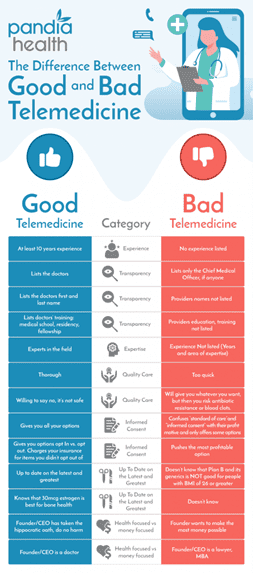Medically reviewed by Sophia Yen, MD, MPH – Written by Pandia Health Editorial Team

With all of the limitations the pandemic put on social interactions, doctors had to get creative when figuring out how to continue delivering care to patients. The answer: telemedicine. While this concept is not new, it has certainly become more popular as a means to safely see patients without having to meet in person.
What is telemedicine?
Telemedicine is a term used to refer to the provision of healthcare by doctor to a patient using electronic means like questionnaires, text messages, phone calls, video conferences, or emails. Think about it like having your doctor on demand.
How does telemedicine work?
Telemedicine is designed to be convenient so that any individual can access treatment from the comfort of their home. Some healthcare providers may have an app (i.e. Amwell and Teledoc) or a website/portal for patients to utilize as a means to communicate with their physicians. Once they log in, a patient can send messages, request prescriptions, and/or book appointments. Providers may also choose to conduct visits via video conference or phone calls. These typically entail logging onto a secure browser to speak privately.
What is telemedicine used for?
Telemedicine is used to easily and effectively bring patients medical care from wherever they are. This is especially helpful for patients who do not live within close proximity to a hospital or other healthcare facility.
It should be noted that telehealth appointments are not meant to replace in-person visits; if anything they compliment each other. Telemedicine is ideal for services that do not require physical face-to-face interaction. This can range from mental health services to follow-ups.
Getting the best telemedicine
With COVID-19, more people are turning to telemedicine to decrease the risk of getting an infection from going into the office/hospital. Thanks to recent technology advancements, it is now easier than ever to receive this care. However, not all telemedicine services are created equal. Here are some important qualities to take into account when choosing your telemedicine provider.
1. Expert care, Specialty services
First and foremost, it’s important to be aware of the experience a provider has in the area where you’re seeking help. For example, if you need help with birth control, perhaps you want to choose a doctor who has written 2000 birth control prescriptions in 2 years versus someone who only writes a birth control prescription once a week. As a general rule of thumb, a doctor with at least 10 years of experience in the field you want care is a good sign.
If you can’t find a provider who specializes in exactly what you’re looking for, you can find one with lots of experience in that field. Even if their main practice is not in the area of concern, they may still have extensive knowledge on the topic. For example, Dr. Sophia Yen, the CEO & Co-Founder of Pandia Health trained in Pediatrics and Adolescent Medicine, but she specializes and has done research and teaches reproductive health. She also received her MPH in Maternal Child Health.
2. Transparency in Telemedicine: Do they list their doctors?
You have the right to know the providers that could be treating you, including their area(s) of expertise and their training (Where did they go to medical school? Are they board certified? How long have they been practicing). If a website only shows the Chief Medical Officer and not the providers, you may want to avoid that practice.
As a patient, there is peace of mind in knowing who has your health in their hands. Having a doctor’s biography listed on a website is important in establishing trust with your doctor — a doctor’s background is also good to know especially if you have specific medical concerns. Transparency provides comfort and helps to establish trust between the healthcare professional and the patient.
3. Quality Care: Fast is not Best
When it comes to your health, you want to see someone who cares as much about your health as you do. A good and thorough doctor asks questions, takes time to understand the issues you’re having, addresses any questions you may have, and gives you their undivided attention. When a doctor is eager to move quickly through your appointment, the quality of care may suffer.
An important component of top-notch care is a doctor that is willing to say, “No, this is not safe for you.” Seeing a doctor that will give you anything you want puts you at risk — getting what you want versus getting what you need can be different. It is better to see a doctor who will tell you when something is not in your best interest.
3. Informed Consent: Do they give you ALL your options?
Providers should ask for your consent either verbally or electronically before proceeding with care. This might entail a debrief on what you can expect from them, how their telemedicine system works, the limitations and benefits of telemedicine, how problems can be troubleshooted, and your responsibilities as a patient. Seek out a provider who lays out all of your options rather than one who is more interested in earning the most money for their company (profit motive).
4. Health-Focused vs. Money-Focused
In general, a profit-focused telemedicine practice will push the more profitable option like the one-year birth control ring versus the one-month birth control ring. Furthermore, it’s important to note whether the provider gives you options or just pushes one method. This way, you can get a better idea of how invested they are in your best interest versus their bottom line. Unfortunately, some providers simply want to make the most money off their patients as opposed to providing the best care. Knowing what to look for when it comes to choosing a telemedicine service can save money down the line.
Look for a company that has a Founder/CEO who has taken the Hippocratic oath (“Do No Harm”) like Pandia Health! Those who take shortcuts typically don’t provide the best care possible. It is also a good sign when the Founder/CEO of the telemedicine practice is a doctor. If their career is in law or business, their company could be very profit-driven and not as care-focused.
At Pandia Health, our CEO Dr. Sophia Yen says, “We will always tell you what’s best for your health, even if it’s not best for our bottom line. We will make money, but we don’t have to do it by pushing products you don’t need or pushing 2nd rate care.” We also try to save you money — birth control pills are “FREE” (no copay, no deductible) for those with insurance providers under the Affordable Care Act. If you do not have insurance, most birth control pill packs cost as low as $15/pack. However, if you cannot afford to pay that price, Pandia Health has a need-based Birth Control Fund that you can apply to.
5. Up To Date on the Latest & Greatest
Healthcare professionals should be up to date on the latest and greatest data within medicine. For example, your doctor should know that 30mcg estrogen is best for bone health in individuals under the age of 30 and that Plan B and its generics are not good for people with a BMI of 26 or greater. If you notice that a provider is unable to answer questions related to your concerns, you may want to seek another practice. *Note: If a provider does not have expertise in all areas, it doesn’t mean they’re bad at their job. Instead, they might be more knowledgeable about different topics based on the education and training they received.
6. Evidence-Based
Data analytics allow physicians to recognize patterns and make efforts for decrease side effects based on what they see from the data. All doctors should be well-versed in this practice in order to provide the most effective treatment with the least amount of side effects for their patients. Having a doctor that takes race into consideration, realizing that we are not all “70 kg white males,” which is what medicine is based on, should result in better outcomes and fewer side effects.
Additionally, telemedicine providers should abide by HIPAA (a.k.a not sharing private medical records) at all times. Having trust in your provider will likely allow you to feel comfortable sharing information, which will in turn, help them get to know you better.
How do I get birth control online?
Getting birth control online is now easier than ever! To sign up with Pandia Health, simply go to our website and click on the “Get Started” button. From there, all you need to do is fill out our online health form, which gets reviewed by one of our expert doctors. The doctor who receives your form will write you a prescription for the birth control method that best fits your lifestyle and health needs based on the information you provided. The last thing to do is sit back and relax while your prescription makes its way to your mailbox.
Get Pandia Peace of Mind
At Pandia Health, we provide 5/5 star google review service. As the ONLY Doctor-Led, Women-Founded AND Women-Led, birth control delivery company, we pride ourselves in providing expert care bay expert doctors for your women’s health needs.
Sign up for our FREE delivery service, so you can #SkiptheTrip to the pharmacy and no longer need to worry about running out of birth control. We can deliver to all 50 states. We can also write prescriptions for patients who live in AZ, CA, CO, FL, GA, IL, MI, MN, NV, NY, OH, PA, TN, TX, and WY. If you live in one of these states and want to start or change your birth control, schedule an online consultation with one of our doctors. *Note: We only prescribe the pill, patch, and ring.
Disclaimer: The above information is for general informational purposes only and is NOT a substitute for professional medical advice. Always seek the advice of your doctor/primary care provider before starting or changing treatment.










